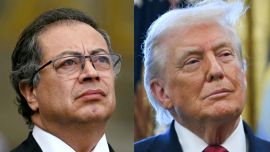Argentina's bid to agree a new financing programme with the International Monetary Fund has been dealt a blow after Máximo Kirchner, the leader of the ruling coalition’s caucus in the lower house, resigned his post in protest at the deal.
Kirchner, the son of Argentina's powerful vice-president, Cristina Fernández de Kirchner said in an announcement that he did not support “the strategy used and much less the results" of the ngotiations with the multilateral lender.
"This decision stems from not sharing the strategy used and much less the results obtained in the negotiations with the IMF, carried out exclusively by the economic cabinet and the negotiating group that answers to and has the absolute confidence of the president," declared the influential deputy.
The Frente de Todos lawmaker said he would step down from his role in order to “free the president so that he does not feel pressured.” He said he would remain part of Frente de Todos in order to continue "to facilitate the work of the president and his entourage.”
After months of negotiations, President Alberto Fernández announced last Friday that his government had agreed a new programme with the IMF that will allow the country access to new financing and buy it time to help it repay its US$44.5-billion debt.
Argentina had been due to pay back US$19 billion to the IMF this year, a weight Fernández described as living with "a rope around its neck.”
During talks, the government pledged to slowly reduce its fiscal deficit and cut the Central Bank’s financing of the Treasury as part of a new economic programme agreed.
The deal still needs to be approved by the Congress and the IMF’s board of directors.
Divisions
The resignation is the clearest sign yet of the division within Frente de Todos over a new agreement with the IMF.
Vice-President Fernández de Kirchner has yet to comment publicly on the situation despite wild speculation in the local press about her position.
Commenting on the resignation in a TV interview late Monday, President Fernández admitted in an interview that his vice-president “has differences” and “a different view” over talks with the Fund.
"Cristina also has her nuances and differences on the issue of the Fund. But I am the president and there is a point at which I have to make decisions," Fernández told the C5N news channel.
"I know that Cristina has a different view. There is a moment when I have to make a decision and I made this decision. I made it convinced that I did it to preserve the Argentine economy. And I am convinced that it was the best agreement that could have been reached with the Fund," he said, speaking frankly about tensions in the ruling coalition.
"In this scenario a default was a huge problem, it was getting out of the game," said Fernández, attempting to justify his deal.
"It was a necessary step. There is nothing to celebrate. I was simply elected president to solve problems and this was the government's biggest problem," declared the president.
He said that Kirchner had spoken to him via telephone on Monday afternoon to inform him of his decision.
"I spoke to him last Wednesday and he told me about his differences on this issue. Today he called me and told me that he had taken this decision. I told him it was not necessary. He told me that he had discussed it with Cristina and she did not agree with his resignation either," he said.
‘Convictions’
Kirchner, 44, said he had appealed to President Alberto Fernández “not to reach this result” and that he could not support a bill with “such decisive centrality in terms of the present and the years to come."
In a lengthy statement, the deputy said that the negotiations were the responsibility of the president and Economy Minister Martín Guzmán, rejecting claims that it was a "tough negotiation" with the multilateral lender because, in his opinion, "it was not."
"It is better to step aside so that, in this way, he can choose someone who believes in this IMF programme, not only in the immediate future but also looking beyond December 10, 2023," he wrote.
"I put prejudices aside and also the grievances received to form the Frente de Todos, but not my convictions," declared Kirchner.
“I do not aspire to a magic solution, only a rational one. For some, pointing out and proposing to correct the mistakes and abuses of the IMF that never harm the agency and its bureaucracy, is irresponsible. For me, it is irrational and inhumane not to do so,” he wrote.
Argentina's government will hold further negotiations with the IMF over the next few weeks to define the details of the agreement, which, according to Fernández and Guzmán, will not impede growth, which in the first 11 months of 2021 reached 10.3 percent.
– TIMES/NA/PERFIL


























Comments